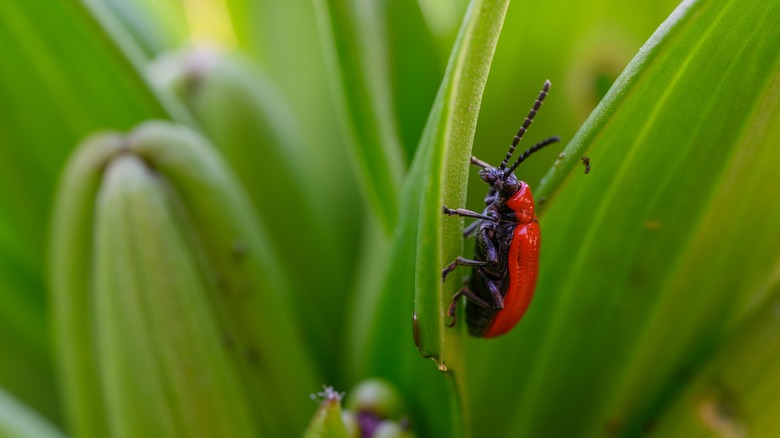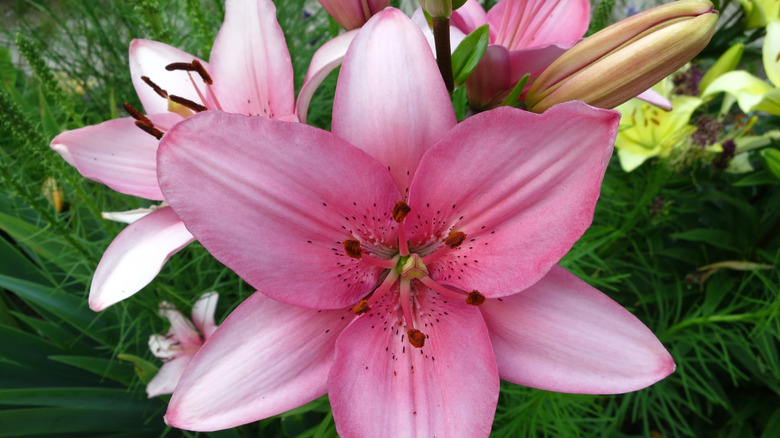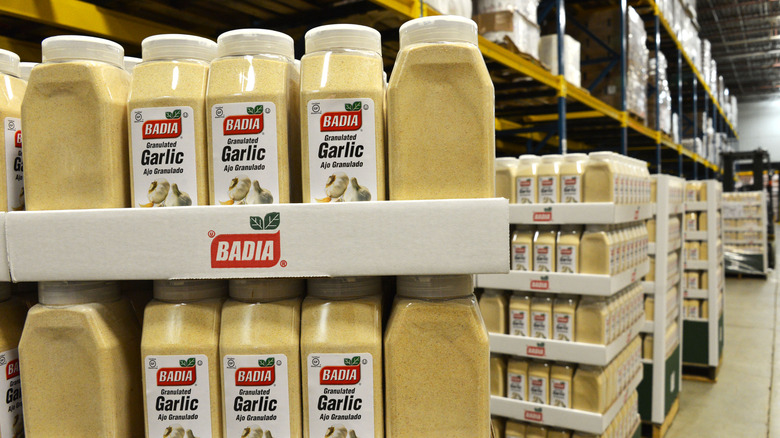How A Sprinkle Of Garlic Powder Can Make Your Garden Thrive
As we deal with things like colony collapse disorder, and the loss of honeybees due to pesticide and herbicide use (among other causal factors), many gardeners are wanting to try less toxic solutions for pests. You can purchase natural formulas, but you can also make your own with a bit of research. Natural garden treatments usually don't require fancy or expensive ingredients: sometimes you can find what you need right in your pantry. One nasty pest that can be vanquished with pantry ingredients is the notorious red lily beetle, which you can eliminate with the use of a simple mix of vegetable oil, water, and garlic powder.
Red lily beetles (also known as scarlet lily beetles or lily leaf beetles) are a nuisance when it comes to the Asiatic lilies in your garden. They arrive in spring as the stems are pushing up, lay their eggs, and in a few weeks the larvae hatch and beetles munch on the leaves and flowers, leaving them full of holes and sticky black detritus all up and down the stems. The lily is basically prevented from producing its beautiful blooms and the stem eventually disintegrates. Once you have red lily beetles in your area, they tend to stick around, though some gardeners have noted the beetles don't necessarily attack every lily that's planted.
There's a very simple, cheap, and effective way to vanquish these pests that doesn't require the use of toxic pesticides. Using an easy recipe, you can make a solution that will discourage and deter the red lily beetles from your lilies.
How to deter red lily beetles the natural way
Once you notice a red lily beetle on your lilies, it may already be too late to prevent them from laying their eggs. But if you quickly treat the plants you can prevent the larvae from hatching and keep the beetles from laying more. The trick is to use this treatment beginning in spring as soon as the lily shoots have gotten about three inches tall and start to form leaves.
Make your anti-lily mixture with the following: 1/3 cup vegetable oil (like canola) to 2/3 cups water, and a tablespoon of garlic powder. Mix in a glass container (like an old peanut butter or jam jar) and shake well. This won't work as a spray because the oil will clog the sprayer, so you must apply as a liquid.
The easiest way to do this is to decant the solution into a smaller glass container with a lid (like a spice jar). Again, shake vigorously before use to make sure the garlic powder disperses. Pour slowly over the top of the plant and the oil should drip right down the stem. Use a teaspoon or two of liquid for each stem. You can also use a glass dropper. This will not harm the plant in any way, and will definitely keep the lily beetles away! Repeat once a week for a month, then every two weeks for the rest of the season.
Other ways to use garlic in the garden
Garlic powder is useful for other purposes in the garden. It is commonly used as a deterrent to rabbits and squirrels, who don't like the smell of it. Rabbits can eat a whole row of lettuce seedlings in minutes, so using garlic powder may help salvage your crop. You can sprinkle it around your flower or veggie beds to keep rodents away, but you need to do this after every rainstorm as a heavy rain can wash the powder away.
Garlic powder can also be an effective ingredient for keeping a number of pesky insects at bay. This can be a relief to gardeners who don't want to resort to using toxic sprays that might harm beneficial insects like pollinators. Garlic powder can help to repel ants, mosquitoes, ants, beetles, caterpillars, flies, cutworms, slugs, and mites. You can sprinkle around the area, or make a spray using garlic powder, water, and a bit of dish soap.
Just as with remedies for lily beetles, using garlic powder works better as a preventive than a cure. Once you know which pests are a problem and when they generally appear, applying some garlic powder can help to deter them before they reproduce or do extensive damage.


